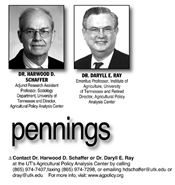A Farm Program That Reduces Farmers’ Dependency On Government Subsidies

Late last year, the Texas Farmers Union (TFU) contracted with us to conduct a study of the use of a supply management program as the basis of a proposed 2018 Farm Bill. They wanted us to update the MDIS study that we conducted for the National Farmers Union (See our columns http://tinyurl.com/yc9m6x6o and http://tinyurl.com/y8yqnv4z) for what was intended to be the 2012 Farm Bill, but ended up becoming the 2014 Farm Bill.
During the period leading up to the 2014 Farm Bill, the crop sector was just coming of a high price peak that resulted from a drought that struck the US Midwest in 2012. And those high corn and soybean prices followed a multi-year period of high prices triggered by the ethanol boom.
Though prices during the writing of what was to become the 2014 Farm Bill were off their peak, most farmers and policy makers were convinced that crop prices were on a new plateau and $4.00 was as low as a bushel of corn would go for any extended period of time. Under pressure from Southern farmers, the Price Loss Coverage (PLC) program – it was designed to provide some protection against extended periods of low prices – was added to revenue insurance and the Agricultural Risk Coverage (ARC) program which protected farmers against year-to-year declines in revenue.
At the time the TFU contacted us, crop prices were going into their fourth year of decline and the support provided by the policies in the 2014 Farm Bill was clearly inadequate; thus, the desire to see if a supply management program would provide better protection than the current policies.
We are conducting this study using the “USDA Agricultural Projections to 2026” (http://tinyurl.com/jzj8g8v) that was released in February of this year (2017). The USDA projections assume a stable production environment and “that the provisions of the [2014 Farm Bill] remain in effect throughout the projection period…. As such, the projections provide a neutral reference scenario that can serve as a point of departure for discussion of alternative farm-sector outcomes that could result under different domestic or international conditions.”
The Agricultural Policy Analysis Center/TFU study (APAC/TFU) examines the departure from the USDA projections that would result from a substitution of a set of supply management policies for the 2014 Farm Bill policies embedded in the projections.
The USDA projections indicate that the average annual net farm income for the 2017-2026 period would be $58.0 billion. The APAC/TFU study results in an average annual net farm income of $82.8 billion, a 43 percent increase over the USDA projection. The total government cost over the 2017-2026 period would decline from $82.7 billion with the continuation of the current program to 59.3 for the alternative.
The average annual cost of the alternative program of $5.9 billion per year is just a little more than the average annual cost of the Direct Payment Program that was eliminated in the 2014 Farm Bill. The ARC and PLC components of the current program are eliminated so those costs are not incurred. The study does not estimate the reduced government outlays for revenue insurance products that are not part of the farm program
The cost savings are a direct result of treating the cause of long periods of low agricultural commodity prices instead of treating the symptoms by backfilling farm income with government payments. Under the APAC/TFU supply management program design, farmers would receive the bulk of their income from the marketplace with a government-subsidized yield insurance program and an environmental short-term acreage reduction program accounting for a small portion of net farm income.
In addition, by reducing revenue insurance costs and eliminating the ARC and PLC, the issues of payment limitations and “who is a farmer entitled to government payments” become virtual non-issues and small farmers enjoy the same benefit (profitable prices) as large farmers.
In the coming weeks, we will work our way through the details of the design of the APAC/TFU study. ∆
DR. HARWOOD D. SCHAFFER: Adjunct Research Assistant Professor, Sociology Department, University of Tennessee and Director, Agricultural Policy Analysis Center
DR. DARYLL E. RAY: Emeritus Professor, Institute of Agriculture, University of Tennessee and Retired Director, Agricultural Policy Analysis Center